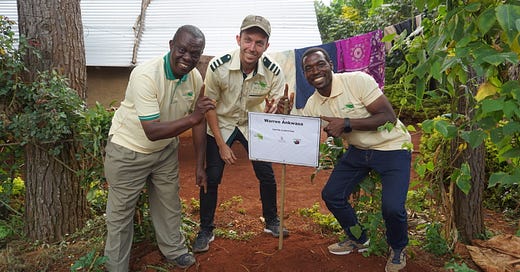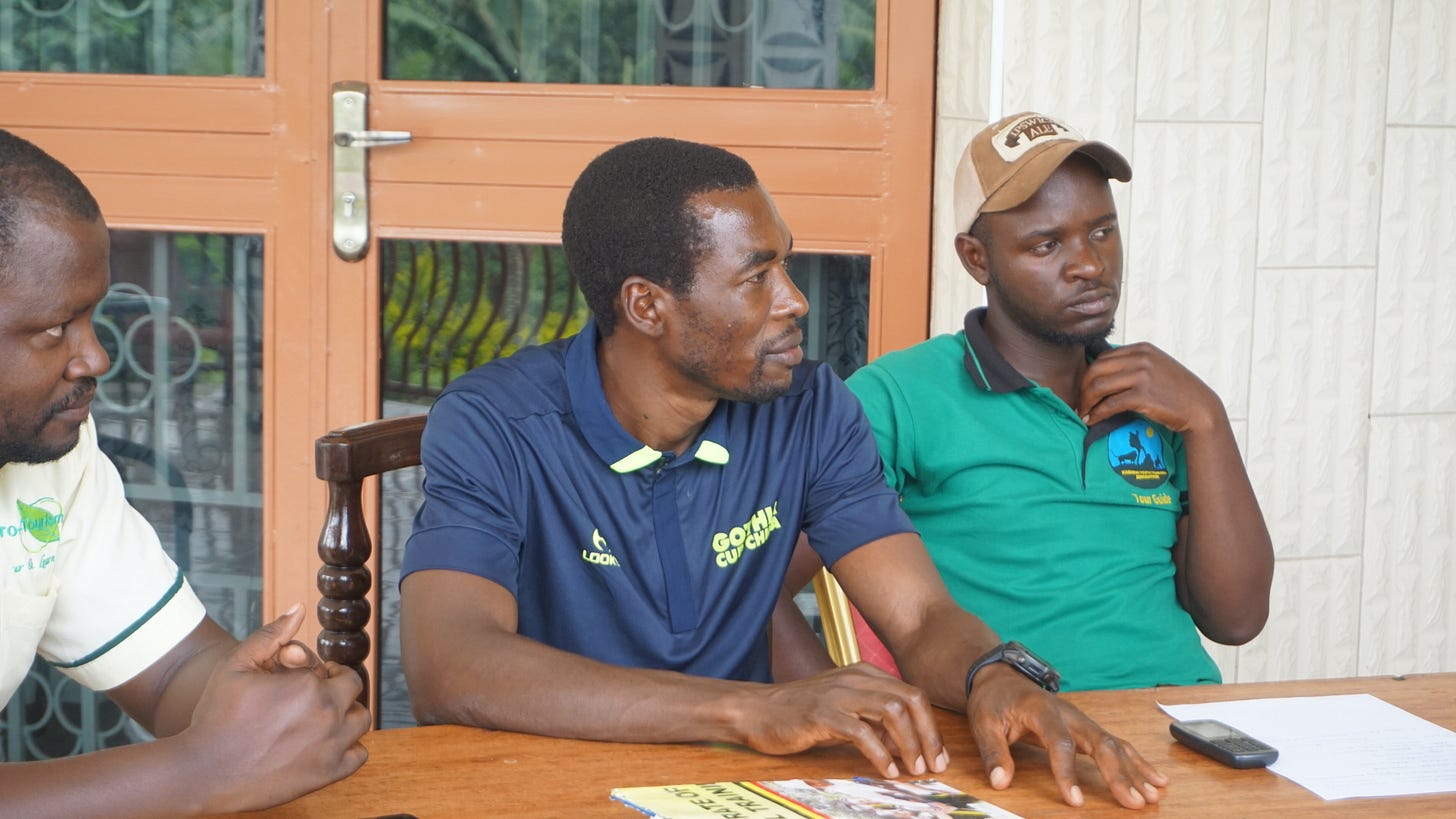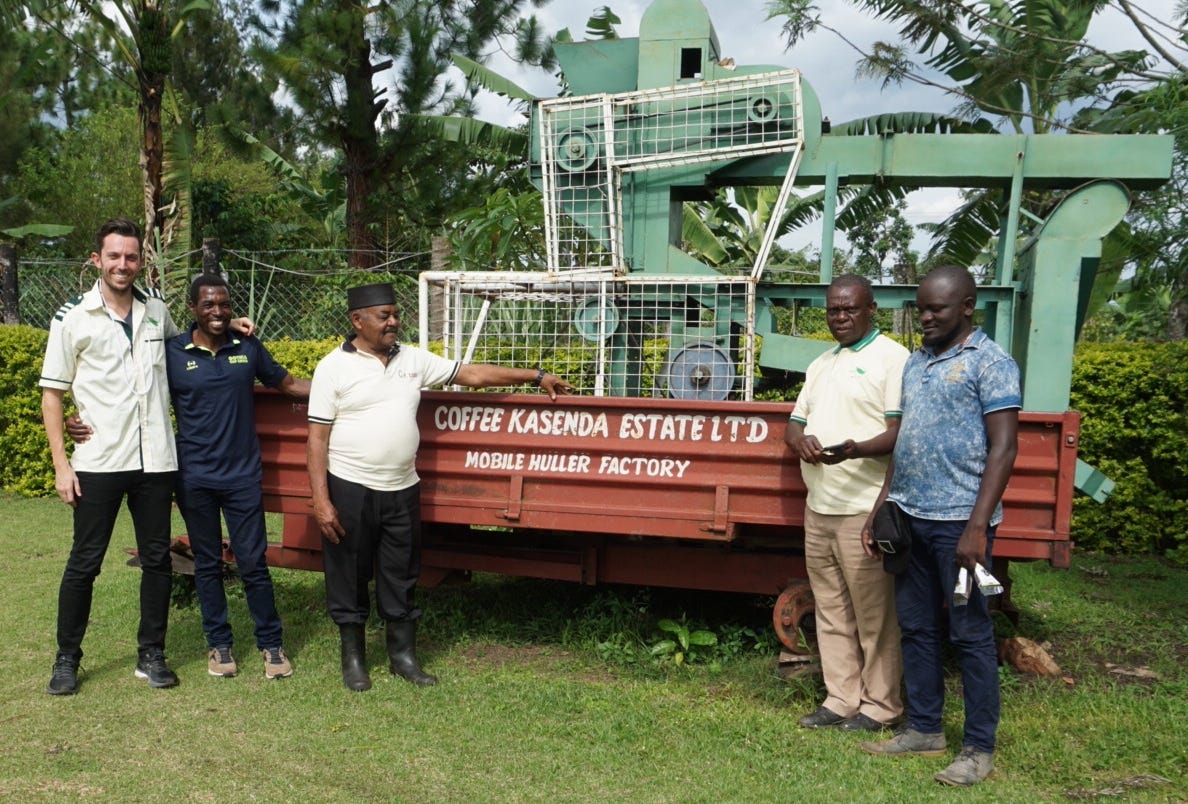Hello,
It is with great pleasure that we introduce today’s newsletter, our interview with Warren Ankwasa, founder of Kikooko Africa Safaris.
In this interview, he shares his extensive background in tourism, how he evaluates agritourism projects, how he works with local communities to ready them for tourists, and the power of combining agriculture and tourism together.
We hope you enjoy listening to and reading this interview as much as we enjoyed creating it.
Can you share a bit about yourself and your experience in the tourism industry?
My name is Warren Ankwasa. I’m Ugandan. I live and work and stay in Uganda. I’m from the Southwestern Hills of Uganda - commonly called Kabale District - which borders countries like Rwanda and Congo.
To help someone who wants to know where I come from is Bwindi Impenetrable National Park, the home of the mountain gorillas. My village home is about half a kilometer from the national park.
More about myself: I studied tourism. I have a bachelor’s in tourism management from Makerere University. I have a master degree in business administration from Kampala International university. For a long time, I’ve worked in the tourism industry, as a person with different responsibilities or Positions. I worked as a volunteering coordinator at Kigezi health care foundation, then I worked as a coordinator of community-based organizations like Kick Corruption Out of Kigezi (KICK), based in Kabale. I also worked as a coordinator for the Kabale Civil Society Forum.
I have been a lecturer for a few years at Kabale University, teaching Zoology, Botany, Tourism Planning & Marketing.
I joined a company called Kazinga Tours, I worked with them for close to 9 years, working as a salesman, involved in planning for marketing of that company, flying overseas to market company products and Uganda in general.
And what is your role with Kikooko Africa Safaris?
I am a founder of Kikooko Africa Safaris. I’m also involved in many projects, especially community-based ones. For now, everything is at a standstill because of the pandemic. That does not stop the thinking and wishing and dreaming.
We keep on. We cannot surrender. We will proceed.
Tourism is good. It’s a very good industry. It’s an industry that connects the world. It opens opportunities for researchers, for business people, it’s an industry that tells us there’s much more than what we think about our countries and ourselves.
It’s an industry that helps people discover who they are. Who they never thought they could be? It opens so many fronts of opportunities. For those who know how it works, they are happy with it.
However, it remains a sensitive industry. It has its influential factors. Some of which tourism business players cannot control.
At any time, you can really get back to zero.
At the same time, it’s an industry that can grow so fast and give you what you really want as a business person.
When you think of agriculture and tourism, and the combination of the two, what possibilities do you find?
The possibilities are enormous. We know agriculture mostly when we take them to guest houses and to lodges, and to accommodation places, that’s when we look at food, when we enjoy what they have prepared for us. Going beyond the food that is prepared, into the field, these wonderful gardens, agriculture and tourism - agriculture remains one of the hidden gold mines for tourism world players.
The effort they put into marketing game safaris in Africa, the effort in marketing tourism cities, some of these tourism events in town, if it would be the same effort the world would part in marketing agriculture, particularly the farmlands and the gardens, around his home, around her community, the opportunity is enormous.
You only need to keep on trying to connect the two, to make sure the world gets to know agriculture and tourism are connected so well. The travelers must get involved in these experiences when they travel to different places.
When you’re speaking to tourists and planning an itinerary, do you have an agritourism or community project in mind? How do you propose it to tourists? What details do you mention for somebody who’s never been to the country?
Normally, it is in the expectation. Depending on where they are going, if they are coming to Africa, they associate Africa as a continent of animals, of forests, national parks, a continent of wildlife. Which basically is true because of our weather and climate. They come with expectations, take photos of zebras, then track mountain gorillas. If they are in Tanzania, maybe they think about wildebeests and kilimanjaro.
Let me be specific. Yes, they have high expectations of nature and wildlife, so it is the responsibility of the tour operator that there is much more than nature can provide. Much more than the wildlife they know. Much more than the people they just think of.
When you think of Uganda and Ugandans, you know that, but who are they? What do they eat? What is their culture? How do they survive from day-to-day life?
Normally what I say, I try to tell them that tourism is everything. It depends on how you package your information, because look you come from Europe, America, and you are here in Uganda.
On the road, everything is different. Get to a point where you are upcountry, in these villages, everything you see is new. Tourism is about giving information. Every piece of information is very special.
The way we communicate it is to encourage them that, yes, you have seen the national parks, the animals, it is much more than meeting Ugandans, the friendly people. I tell them get into these homes, get into these communities, get into small gardens they have, get into their kitchen and see what they prepare and how they prepare it.
Can you participate and go to the field and collect it for yourself? Luckily, this food is fresh and most likely organic. Go to the kitchen and prepare it.
Some have never seen - if you talk about pineapple, or banana - they think of it as one species. We have about 95 varieties of bananas in Uganda. Uganda is among the top 3 countries with great varieties of bananas. Most travelers don't know. Bananas are bananas.
We have different types of what we take as bananas for food - for making porridge - for making alcohol.
There’s a lot that clients or travelers miss when they don’t get into agriculture or communities. For me, with my company, we have always encouraged - and actually surprised - that is not about what they thought. There’s much more on the menu.
When you’re putting together these itineraries, clearly there are some constraints (budgetary limits, number of days). When you think about adding a new agricultural project to your itinerary, how do you think about how it fits in?
That is where the challenge comes in for many tourism players. They tend to focus and give priorities to chameleon tracking, gorilla tracking, or game drives. This is because they think the mind of a traveler is only about Gorillas in Uganda.
They give this time, one day, two days, 10 days, priority to nature and wildlife. Time has never been enough. It’s only how you budget it and the priorities you have.
With experience of happy clients, I make sure community projects are given priority.
The percentage… if they are in Uganda for 10 days. Highlight of game drive, primate tracking, 2-3, 4 days. I bring the third point as part of community experience. I give it enough time in planning already. I don’t wait until they are here in Uganda and start adjusting.
I prepare it in a way that includes community visit, tribal visits, activities to participate in, I talk about it, I shape it. As something not to miss.
It’s not about an hour, three hours of drive. It’s about how you prepare.
You can’t tell me someone flies from Europe. 8,000 km. Then in Uganda, the distance is too far, one hour, three hours.
It’s about the packaging. How much do you know about these communities and their culture and their food and their activities?
These players are not informed about agritourism products, about these communities and what they can do. Those who are informed, who know how to talk and package.
We sell information. Everything is information. Package your information properly. Know what you will involve your clients in and they will be happy to participate.
Since you founded a tourism company, how do you hear about new agritourism products?
The challenge we have is that people are lazy. Lazy to think, to research, even to know what they should know. And because of this, luckily some tourism players in Uganda, everything we have in Uganda is kind of new so it's very easy to satisfy a tourist visiting Uganda for the first time.
Uganda is a new destination. Uganda is not known. Someone who stops in Entebbe, Kampala, National Park cannot Understand Uganda or know Uganda the way Uganda is.
We have over 50 islands in Lake Victoria. Beaches that could be developed here. There are activities and experiences one would get … they’re simply thrilling. When we are going to these national parks within the country.
But we just follow specific tour circuits. They claim they didn't have enough time. So, they can go to these highlights. Forget thinking about new products.
We have a lot. Uganda is a country - once you visit and you’re here for 15 days and you say you know Uganda, I’d say no. A tour of 30 days, and you’d still not know.
Every village is different, every different region is different, every place you enter tells you a lot that you never thought about Uganda.
The challenge of new products and not being known, agro products not being known - the reason is simple, everyone comes for the first time, everything they see is attractive, very good, they see these things they’ve never seen in other countries or other places in the world. It keeps them happy. It’s just easy to satisfy Uganda tourists visiting for the first time and unfortunately this keeps tour operators in Uganda not thinking beyond or being creative to what is already in Uganda’s tourism market.
It is not easy to be creative, to think right is to create. People have challenges there. There are so many new agritourism products. SO many new experiences. So many activities and happenings.
My mindset, we associate traveling, tours, with nature & wildlife. Less attention is given to these new tourism products, new agritourism products.
The challenge is that people are only used to what they know and what they’ve heard.
For you and Kikooko, how do you hear about new projects?
As a company, we never take tourists or clients to a product we have not tried or tested ourselves.
So we try to be there first before we start talking about it.
Our approach is research. We go district by district. We send drivers and guides and researchers into these districts.
We involve communities. Whether you’re on a tour or not, whichever area, we want to know what they’re doing. What do they know that we don’t know? We explore all these opportunities of new information and stories.
We have many people in Uganda who don't know other places other than where they have been born and apart from where they live.
We don't fully know our country Uganda.
As a company, we recognize such gaps, that weakness.
We don’t just go to lodges or camps or tourism activities. We try to involve the communities, listen to their stories, then get deep into their gardens, homes, what they have, then we collect more information than other tourism players In the country.
This is also because we like to bring new things to the table.
We go out and collect information as a company, then package it for tourists.
Do you have a set of criteria when you’re evaluating if a place is ready to welcome tourists?
Tourism business is misused by both local and international players. Some of these communities where tourism takes place, where tourism always goes, have been turned into beggars. Some kids don’t go to school because they expect a tourist will give something.
So many projects in the community are stage managed. You organize people to dance, to show something, they are along the way to dance or shout. As a company we say no to this approach.
Some of our wildlife, especially the chameleons, community knows that tourists love these animals. They go into the park, into the bush, put a chameleon on a stick, on the road showing the chameleon, then guess what, they need to be paid.
That’s very dangerous for the mindset, very dangerous for nature, and stressful for the chameleon.
As a company, we don’t allow such things to take pace.
Preparing and training and orienting a home before you start taking a tourist there. Once you are there with tourists - they won’t beg, they’ll lead a normal life - they’ll get to know some tourists are having financial issues, more lifetime private issues, than local people.
First train people, tell them what your goals are, your vision is, and after they understand you, you’ll never have an issue.
We are aware of dangers as a company. Orient, train, identify. These villages, these local people, these attractions, steps to develop a tourism product.
Anything else to add?
As Kikooko Africa Safaris, we are a business company, we try to make money, but the impact we leave after we make money is something we cautiously and carefully take care of. We try to make money but we cannot forget that we have a legacy. As a company, that anyone else can say yes this was a true company to deal with. This legacy is all about sustaining our mother nature, our original cultures and making a real impact on the communities we work with. The communities we work with are aware that they will not wait till they see tourism walking to their villages, they know they have to prepare a lot to benefit from this very sensitive business.
We extend our thanks again to Warren for taking the time to share his experience in tourism. To read more about Warren’s company, we encourage you to go to Kikooko Africa Safaris.
Warmly,
Alex & Joseph











Share this post